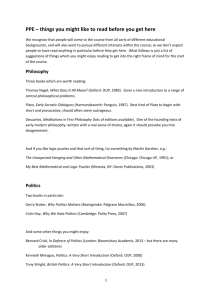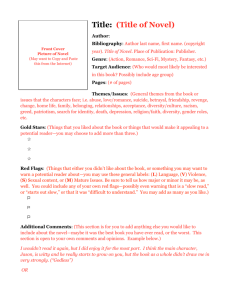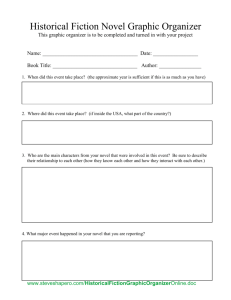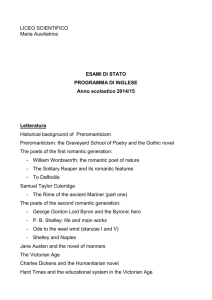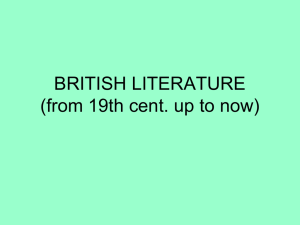Gender, Gothic, and the Nation - LLC Board of Studies Committee
advertisement
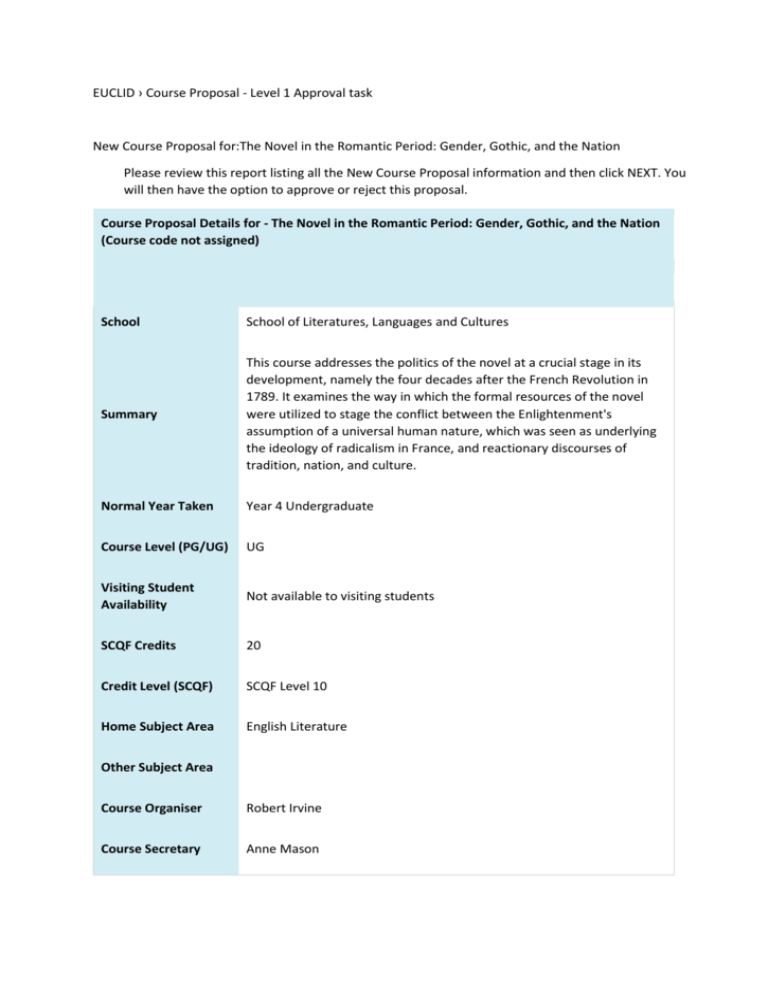
EUCLID › Course Proposal - Level 1 Approval task New Course Proposal for:The Novel in the Romantic Period: Gender, Gothic, and the Nation Please review this report listing all the New Course Proposal information and then click NEXT. You will then have the option to approve or reject this proposal. Course Proposal Details for - The Novel in the Romantic Period: Gender, Gothic, and the Nation (Course code not assigned) School School of Literatures, Languages and Cultures Summary This course addresses the politics of the novel at a crucial stage in its development, namely the four decades after the French Revolution in 1789. It examines the way in which the formal resources of the novel were utilized to stage the conflict between the Enlightenment's assumption of a universal human nature, which was seen as underlying the ideology of radicalism in France, and reactionary discourses of tradition, nation, and culture. Normal Year Taken Year 4 Undergraduate Course Level (PG/UG) UG Visiting Student Availability Not available to visiting students SCQF Credits 20 Credit Level (SCQF) SCQF Level 10 Home Subject Area English Literature Other Subject Area Course Organiser Robert Irvine Course Secretary Anne Mason % not taught by this institution Collaboration Information (School / Institution) Total contact teaching hours 20 Any costs to be met by students Pre-requisites Students MUST have passed: ( English Literature 1 (ENLI08001) OR Scottish Literature 1 (ENLI08016)) AND ( English Literature 2 (ENLI08003) OR Scottish Literature 2 (ENLI08004)) Co-requisites Prohibited Combinations Visting Student Prerequisites Keywords Novel, Gender, Gothic, Nationality, Romantic Period, French Revolution Fee Code (if invoiced at course level) Proposer Jacqueline Barnhart Default Mode of Study Assessment Default delivery period Semester 1 Marking Scheme to be employed Common Marking Scheme - UG Honours Mark/Grade Taught in Gaidhlig? No Course Type Standard Special Arrangements Components of Assessment Course Essay 30% (2,500 words); class participation assessment 10%; exam 60% (2 hours) Exam Information Syllabus: Syllabus 1. Introduction 2. William Godwin, Caleb Williams (1794) 3. M.G. Lewis, The Monk (1796) 4. Emma Hays, The Memoirs of Emma Courtney (1796) 5. Sydney Owenson, The Wild Irish Girl (1806) 6. Maria Edgeworth, Castle Rackrent (1801) and Ennui (1809) 7. Jane Austen, Mansfield Park (1814) 8. Walter Scott, Waverley (1814) 9. John Galt, Ringan Gilhaize (1823) 10. Stories from Blackwood's Edinburgh Magazine by James Hogg and others Feedback Graduate Attributes and Skills Study Abroad Reading List Header Reading List Compulsory: Reading Lists William Godwin, Caleb Williams. Oxford: World's Classics, 1982. M.G. Lewis, The Monk. Oxford: World's Classics, 1982. Emma Hays, The Memoirs of Emma Courtney. Oxford: World's Classics, 1996. Sydney Owenson, The Wild Irish Girl. Oxford: World's Classics, 1999. Maria Edgeworth, Castle Rackrent (1801) and Ennui. Harmondsworth: Penguin, 1992. Jane Austen, Mansfield Park (1814), Harmondsworth: Penguin, 1996. Walter Scott, Waverley (1814), Harmondsworth: Penguin, 2011. John Galt, Ringan Gilhaize (1823). Edinburgh: Canongate, 2010. Stories from Blackwood's Edinburgh Magazine by James Hogg and others will be supplied by the teaching team via VLE. Recommended: Burke, Edmund. Reflections on the Revolution in France. Harmondsworth: Penguin, 1968. Butler, Marilyn. Romantics, Rebels and Reactionaries. Oxford: OUP, 1981. Colley, Linda. Britons: Forging the Nation, 1707-1837. New Haven: Yale UP, 1992. Duncan, Ian. Modern Romance and Transformations of the Novel: The Gothic, Scott, Dickens. Cambridge: CUP, 1992. Ferris, Ina. The Romantic National Tale and the Question of Ireland. Cambridge: CUP, 2002. Gallagher, Catherine. Nobody's Story: The Vanishing Acts of Woman Writers in the Marketplace, 1670-1820. Berkeley: University Of California Press, 1994. Johnson, Claudia. Jane Austen: Women, Politics and the Novel. Chicago: University of Chicago Press, 1988. ---. (1995) Equivocal Beings: Politics, Gender, and Sentimentality in the 1790s. A Study of Wollstonecraft, Radcliffe, Burney, and Austen. Chicago: University of Chicago Press. Kelly, Gary. English Fiction of the Romantic Period, 1789-1830. London: Longman, 1989. ---. Women, Writing, and Revolution 1790-1827. Oxford: Oxford University Press, 1993. Klancher, Jon. The Making of English Reading Audiences 1790-1832. Madison WI: University of Wisconsin Press, 1987. Lynch, Deirdre. 'Nationalizing Women and Domesticating Fiction: Edmund Burke and the Genres of Englishness.' Wordsworth Circle 25.1 (Winter 1994): 45-49. McMaster, Graham. Scott and Society. Cambridge: CUP, 1981. Siskin, Clifford. The Work of Writing: Literature and Social Change in Britain, 1700-1830. Baltimore: Johns Hopkins UP, 1998. Trumpener, Katie. Bardic Nationalism: The Romantic Novel and the British Empire. Princeton, NJ: Princeton UP, 1997. Watson, Nicola. Revolution and the Form of the British Novel, 17901825: Intercepted Letters, Interrupted Seductions. Oxford: Clarendon, 1994. Wollstonecraft, Mary. A Vindication of the Rights of Woman. Harmondsworth: Penguin, 1982. Course description This course will introduce the student to the history of the novel in a crucial stage of its development. Each wee (narrative voice, focalization, plot structure etc); their thematic relation to the historical/political contexts in w route through these issues will fall into three (chronological, but also thematic) stages. After an introductory se by events in France. The last of these texts, Mary Hays's Memoirs of Emma Courtney, introduces the student to to explore women's writing, first the groundbreaking Irish 'national tale', and then by Jane Austen. In this part o addressing the social and political questions explored in the previous three weeks. At this point the student will submit a term essay (2,500 words) on the material covered so far. Research for th seminar discussion. The last three weeks of the course turn to Scottish fiction and Scott's transformation of the 'national tale' into t position to understand the gender politics of these male-authored texts, as well as their more obvious national Learning outcomes 1. By the end of the course a student will be able to demonstrate competence in core skills in the study o 2. By the end of the course the student will be able to demonstrate an understanding of the political deba 3. By the end of the course the student will be able to distinguish the various genres and modes of fiction 4. By the end of the course the student will be able to analyse the relationships between gender, nationa 5. By the end of the course a student will be able to demonstrate the ability to reflect critically on a variet Latest Approval Status Submitted for Level 1 Approval? Yes Level 1 Approval Status Awaiting Decision Level 2 Approval required? - Submitted for Level 2 Approval? - Level 2 Approval status - Senatus Approval required? - Submitted for Senatus Approval? - Approved by Senatus? - Full Approval Status - Submitted for input of further task details? - Further Course Details task completed? - Has Proposer cancelled proposal? No Reasons for rejection Level 1 rejection reason - Level 2 rejection reason - Senatus rejection reason - Uploaded Supporting Documents Document File Name - click on name to view document CHSS Course Proposal for LLC Novel in the Romantic Period.docx You can leave this task by clicking on the Exit button. You can return to the task at a later date via the message in the Intray. Submit



